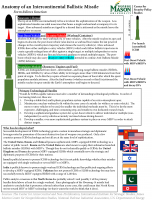By Lee Roberts
Sep 22, 2017
While the United States seems to persist in the hope that it can successfully deter North Korea from continuing its nuclear and ballistic armament, the back-and-forth suggests a fundamental misperception on the part of the U.S. Specifically, the U.S. appears to underestimate the value North Korea places on nuclear armament while also overestimating American credibility from the North’s perspective. For a variety of reasons it appears that the dynamic between North Korea and the United States conforms to the spiral model of escalation described by political scientist Robert Jervis; however, appeasement by the U.S. is simply not a credible option.
Deterrence consists of threatening, compelling, or coercing a state into abandoning a course of action that is undesirable to the deterrer. When deterrence works, the deterrer delivers threats and inflicts incremental amounts of pain – whether economic or military – and succeeds in modifying the behavior of its target aggressor, thereby stopping short of having to commit the resources and inflict the pain that an actual war would entail. Deterrence is essentially the opposite of appeasement, wherein the appeaser offers the target aggressor a fraction of the latter’s aims in exchange for an explicit or implicit assurance that the aggressor will not attack.
Deterrence will fail when the aggressor state sees the deterrer as lacking credible resolve and/or when the pain (or merely insult) inflicted by the deterrer makes the achievement of the aggressor’s war aims even more of an imperative. The 1982 Falklands War between the United Kingdom and Argentina is a good illustration of failed deterrence as the result of misperception. The United Kingdom attempted to deter the Argentine Junta from occupying the islands by repeatedly asserting their status as British possessions and the UK’s willingness to defend them. Argentina did not see the British assertions as credible, and in fact because of domestic unrest saw occupation of the Falklands as yielding a political win through successful defiance of a much more powerful country. Although the UK wrested the Falklands from Argentina easily, it had to commit to an actual war and so did not succeed in its attempt at deterrence.
Appeasement will fail when the aggressor state sees the appeaser as making concessions out of fear of a war that they could not win. The appeasement basically becomes “free chicken” and the aggressor can continue to pursue a path to war, its resource pool swelled by the concessions it has just received. Perhaps the most famous example of this is the Munich Agreement where the United Kingdom and France allowed Germany to annex parts of Czechoslovakia in 1938. While the agreement was intended to dissuade Germany from embarking on an expansionist war, the signals of weakness that Hitler perceived from Britain and France strengthened his resolve to do so.
Where, then, does the United States find itself with respect to North Korea? The U.S. has pursued a strategy of deterrence and recommitted to that strategy under the current administration. The U.S. delivers both threats – increasingly colorful of late – and pain in the form of unilateral and American-driven multilateral sanctions. For deterrence to work, North Korea would need to see American resolve as credible and ascribe more utility to abandoning its current course than to pursuing it. In the case of successful deterrence, we would likely see the North suspending or slowing its tests and signaling that it was open to talks (or perhaps talks about talks). Instead, we see a committed and public pursuit of nuclear arms and ballistic missile programs accompanied by escalating and lately uniquely focused rhetoric calling the resolve of the U.S. and its allies ever more into question. North Korea explicitly says that American threats justify the North’s nuclear ambitions, and it may not simply be bluster.
Does this mean that the answer is appeasement? Unfortunately, appeasement also hinges on credibility. After having delivered threats and pain for so long, a shift to appeasement on the part of the United States would be unimaginably embarrassing and furthermore beggar belief on the part of the North that the promised incentives would actually be delivered. Only incontrovertible compliance with North Korea’s most audacious demands – including the pullout under duress of nearly 30,000 U.S. troops from South Korea, a complete diplomatic and political non-starter – could come across to the North as believable.
The utility of intercontinental nuclear armament is simply too high for the Kim regime to resist. As North Korea’s nuclear and ballistic missile programs proceed, it gains ever more leverage and embarrasses the United States and its allies more and more. The latter group responds with threats that lack credibility and sanctions whose pain provokes the North without inducing it to abandon its course. Full appeasement is unthinkable (though there are U.S. voices advocating for it) and incremental appeasement lacks credibility.
If the United States cannot credibly induce North Korea to change its actions – and since it is untenable to allow the North to continue to test and potentially proliferate its technology to other rogue actors – the U.S. must induce a more credible actor over which there exists some American leverage (China) to take the lead in modifying North Korea’s behavior through threats and positive incentives.
At the same time, to both avoid appearing incapable as well as to mitigate the real threat to the region posed by stray or malicious North Korean missiles, a technology-heavy approach of active containment appears promising. It admittedly hinges on a lot of lucky shots in order to stop missiles in their ascent phases and carries the risk of emboldening the North any time there is a failed interception; however, in addition to dramatically reducing (though not eclipsing) the missile threat it could serve the additional function of motivating China to work to resolve the situation more quickly.
Active containment undeniably raises the stakes since it adds an overtly military dimension (beyond simple shows of force); however, rather than adding military measures to threats and sanctions as additional forms of direct deterrence, active containment would instead corral North Korea into responding to Chinese incentives. Specific, committed, and credible agreement between the United States and China, then, is an absolute imperative.
However the standoff plays out – and assuming, optimistically for a moment, that it does not end in a nuclear exchange – the episode raises troubling questions for nonproliferation in the region. South Korea, Taiwan, and Japan (whom Mark Fitzpatrick describes as “Asia’s latent nuclear powers”) all have the capital and technological prowess to nuclearize but refrained due to reliance on U.S. deterrence of nuclear threats originating primarily (at least until recently) in China. If the effectiveness of U.S. deterrence is called into question, Fitzpatrick points out, these countries’ strategic calculus might well prompt them to nuclearize.
Lee Roberts is a graduate fellow of the Center for Security Policy Studies enrolled in the International Security Program at the Schar School of Policy and Government. He is an active duty U.S. Army Strategic Intelligence Officer and a graduate of the United States Military Academy at West Point. The views and opinions expressed in this piece are solely those of the author and do not represent the positions of the Department of the Army, the Department of Defense, or the United States government.
Disclaimer
The articles and other content which appear on the Center for Security Policy Studies website and social media posts are unofficial expressions of opinion. The views expressed are those of the authors, and do not reflect the positions of the Schar School of Policy and Government or of George Mason University.
The Center for Security Policy Studies does not screen articles to fit a particular editorial agenda, nor endorse or advocate material that is published. The Center for Security Policy Studies merely provides a forum for scholars and professionals to share perspectives and cultivate ideas. Comments on any digital outlet of the Center for Security Policy Studies will be moderated to ensure logical, professional, and courteous application to intellectual content.






